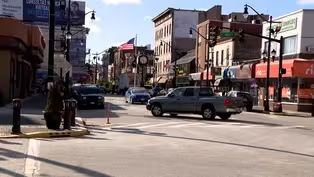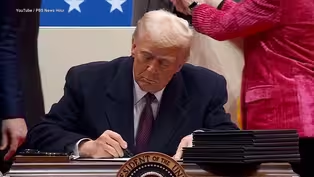NJ Spotlight News
What is a presidential executive order?
Clip: 1/21/2025 | 5m 51sVideo has Closed Captions
President Trump faces limits to what executive orders can and can't do
President Donald Trump's first full day of his second term in office included firings, appointments, a major infrastructure announcement, and a blitz of executive orders -- among the fastest and most powerful tools at a president’s disposal. But there are limits to what executive orders can and can't do
Problems playing video? | Closed Captioning Feedback
Problems playing video? | Closed Captioning Feedback
NJ Spotlight News is a local public television program presented by THIRTEEN PBS
NJ Spotlight News
What is a presidential executive order?
Clip: 1/21/2025 | 5m 51sVideo has Closed Captions
President Donald Trump's first full day of his second term in office included firings, appointments, a major infrastructure announcement, and a blitz of executive orders -- among the fastest and most powerful tools at a president’s disposal. But there are limits to what executive orders can and can't do
Problems playing video? | Closed Captioning Feedback
How to Watch NJ Spotlight News
NJ Spotlight News is available to stream on pbs.org and the free PBS App, available on iPhone, Apple TV, Android TV, Android smartphones, Amazon Fire TV, Amazon Fire Tablet, Roku, Samsung Smart TV, and Vizio.
Providing Support for PBS.org
Learn Moreabout PBS online sponsorshipWhile executive orders are among the fastest and most powerful tools at a president's disposal to help them achieve their goals.
The directives are legally binding documents that enable the president to wield power without approval from Congress.
Political historians say it's standard practice for an incoming president to sign a flurry of executive orders on day one in office.
But there are limits to what the orders can achieve.
For more on that, I'm joined by Micah Rasmussen, director of the Rebovich Institute of New Jersey Politics.
Micah, I feel like you're the perfect person to help break this down.
Let's just start very basically, what is an executive order?
This is a unilateral action that the president takes regarding what his executive branch is going to do, how it's going to do it, what it's not going to do.
When you think about our federal government, you typically think about checks and balances.
You think about Congress making a law and the president enforcing it.
This is a unilateral action by the president, by the executive branch that doesn't have legislation behind it.
And so increasingly, I think it's harder to get Congress to agree to something.
And so we are relying more and more on executive orders because that's something that can be done more easily.
Yeah, it does sort of bypass that approval.
What can they do and what can't they do?
I mean, there are limits on executive orders.
No.
Absolutely some of them.
The president has clear, unquestioned authority.
He can do it with immediate effect.
Like, for example, the pardons of January six, defend.
There's not going to be any second guessing that he also has the power to impose tariffs.
That's an ability that the president has.
It's not something that can be revoked.
The enforcement of federal immigration laws that are already on the books.
Deportations.
If he wants to produce a drone report, for example, he can do that.
But there are some that will be questioned that will require congressional authority.
Any that require budget resources, for example, that's going to have to be approved by Congress, that has to approve of any spending.
The salt cap expiring at the end of this year.
He's made it clear he wants to see his party negotiate changes to it.
So that's something that will have to go through Congress.
Then I guess sort of this third category, presidential actions that are going to be susceptible to strong legal challenges.
And I put ending birthright citizenship firmly in this camp.
That's a congressional excuse me, That's a constitutional right.
It's outlined in the Constitution revoking offshore wind leases that have already been approved.
That's going to be something that, you know, existing leases are going to close out because they've been spending a lot of money based on those leases that they've had.
Or reversing congestion pricing, for example, if that's something that Trump is interested in doing.
So I sort of put it in those buckets, clear, unquestioned authority is going to need a little more congressional action or things where he's going to get a lot of pushback.
Yeah, that's helpful.
And of course, we've already seen lawsuits that were filed within the first few minutes after the inauguration.
So, I mean, you mentioned Congress, of course, still controls the purse strings.
They can refuse to provide funding or to help carry out some of these executive orders.
But I guess I'm wondering who has the power to overturn these?
Does anyone the federal courts have the authority to over overturn some of them?
For example, if if Trump does something that is unconscious institutional.
If he were to revoke birthright citizenship and someone will to sue and say that's a constitutional right and assert their constitutional rights, the federal court at that point would have the ability to say, you're right, you have that right, and nobody can take it away from you.
But most of them that at least where they involve unquestioned presidential authority, he will not get back.
And frankly, we should make a note that at least for these first two years, the GOP has the trifecta of the federal government.
It's got control of the Senate, it's got control of the House.
It's got to control the White House and for that matter, it's got an awful lot of federal judges in the position to review these appeals.
So I think a lot of them are going to be in good shape, at least until the public has a chance to evaluate and say we want to keep this party in power or we want to make adjustments at midterms.
Sure.
No, that's a good point.
I mean, it's fairly standard practice, right, for presidents.
They get into office, they issue executive orders on their first day.
How frequently do we see them?
I mean, we're talking about the sheer amount here on day one.
How does that compare?
I think it's a it's a very good question, because with the pendulum going from Republican administration to Democratic administration, there are some administrative orders, presidential orders that we just expect.
Right.
Show reversals on abortion policy, federal abortion policy.
That's something that has swung back and forth for the last several administrations.
But you're right, where we might expect 100 or 150 over the course of administration.
Now, we saw many times more that just in the first day.
And so this volume is largely reversed.
Over 80 of Biden's executive orders just in the first day alone.
So the volume has definitely picked up here.
Yeah.
Which of course, made good on his campaign promises as he told the American public he would.
Micah Rasmussen like always good to talk to you.
Thanks so much.
Thanks, Briana.
High-profile names lining up for NJ's 32nd District primary
Video has Closed Captions
Clip: 1/22/2025 | 4m 15s | With the competition, the Hudson County district will be a race to watch (4m 15s)
Gov. Murphy promotes benefits of full-day kindergarten
Video has Closed Captions
Clip: 1/21/2025 | 4m 41s | The governor points to success in West Windsor-Plainsboro School District (4m 41s)
NJ challenges Trump’s order blocking birthright citizenship
Video has Closed Captions
Clip: 1/21/2025 | 5m 23s | AG Matt Platkin announces NJ is leading other states in a lawsuit to block the order (5m 23s)
Providing Support for PBS.org
Learn Moreabout PBS online sponsorship
- News and Public Affairs

Top journalists deliver compelling original analysis of the hour's headlines.

- News and Public Affairs

FRONTLINE is investigative journalism that questions, explains and changes our world.












Support for PBS provided by:
NJ Spotlight News is a local public television program presented by THIRTEEN PBS


